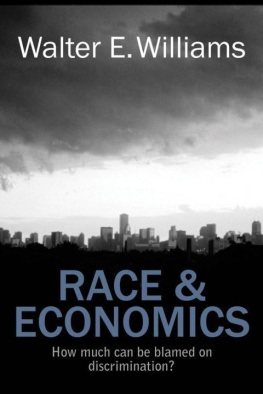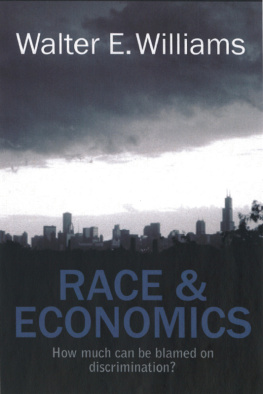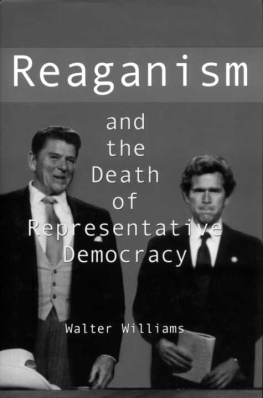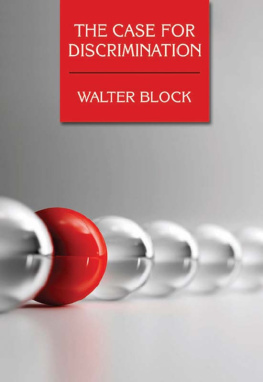RACE & ECONOMICS
Walter E. Williams

How much can be blamed on
discrimination?
THE HOOVER INSTITUTION ON WAR, REVOLUTION
AND PEACE, founded at Stanford University in 1919 by
Herbert Hoover, who went on to become the thirty-first
president of the United States, is an interdisciplinary
research center for advanced study on domestic and international
affairs. The views expressed in its publications are entirely those
of the authors and do not necessarily reflect the views of the staff,
officers, or Board of Overseers of the Hoover Institution.



To the memory of all those Americans,
both black and white but now long dead,
who shed their blood, sweat, and tears to
help our nation live up to the letter and spirit
of the principles of its founding documents.
Contents
ix
CHAPTER 1 5
CHAPTER 2 11
CHAPTER 3 31
CHAPTER 4 59
CHAPTER 5 83
CHAPTER 6 111
CHAPTER 7 135
Acknowledgments
This work is a result of a number of years gathering research materials, writing, and letting the manuscript sit; gathering more materials, writing, and letting the manuscript sit before I finally accepted an invitation for it to be published. The manuscript has benefited immensely from my exchange of ideas with my longtime friend and associate Thomas Sowell of the Hoover Institution. I want to thank the librarians at Villanova University and George Mason University Law School for their assistance. I am also indebted to the patience and encouragement of Connie Williams, my now-deceased wife. Finally, a word of thanks to Kathleen Spolarich, my assistant, who typed up numerous drafts of the manuscript.

Preface
RACIAL ISSUES OFTEN GIVE RISE to high emotions but little understanding. The black experience in America naturally creates a temptation to think of today's black experience in terms of white racism and oppression. My purpose in writing this book is to apply simple economic analysis to some of the problems that black Americans have faced in the past and still face today. There is no question that they suffered gross violations of basic human rights in the forms of chattel slavery, discrimination under Jim Crow laws and customs, and personal violence-lynching, beatings, and arson. But an acknowledgment of and consensus on those injustices, and on residual discrimination, do not carry us very far in evaluating what is or is not in the best interest of blacks nowadays.
One of the things that economics brings to the analysis is explicit recognition that people will not engage in activities-including racial discrimination-no matter what the cost. Although racial discrimination imposes costs on those discriminated against, the person or entity doing the discriminating also bears costs. Recognizing that, along with the generalization that people instinctively seek to reduce costs, suggests that one of the contributions economics can make is to analyze methods a discriminator uses to reduce them.
I shall argue that free-market resource allocation, as opposed to allocation on political grounds, is in the interests of minorities and/or lesspreferred individuals. This assertion is not simply a matter of ideological preference; there is evidence for it. In markets, because their transactions are mostly an individual affair, it is unnecessary to win the approval or permission of others; the costs and benefits are a private matter. In free markets, people can register the intensity of their preference. For example, if a person wants a particular job, he can indicate how much he wants it by bidding down the wage he is willing to accept. If renting an apartment, he can offer a higher price. The market encompasses a sort of parity nonexistent in the political arena, where one person's dollar has the same power as anyone else's.
Contrast these features of market-resource allocation with those of the political arena. In the latter, minorities cannot realize a particular preference unless they win over the majority. In addition, each citizen has only one vote, which means that, unlike in the free market, he cannot register the intensity of his preference. Further, increased concentration of political power at the national level handicaps minorities in the sense that their votes become more diluted. For example, blacks comprise about 44 percent of the population of Philadelphia but 13 percent of the population of the United States. The concentration of black votes-bloc voting-is therefore far more influential in Philadelphia's political decision-making arena than in the national one. The greater the number of decisions that are made nationally, the smaller the significance of black votes will be. As a generality, if one is a member of a minority, he is less likely to realize his preferences if decisions are made in the political arena, particularly if they are made at the national level.
Consider another comparison between market- and political-resource allocation. If one tours a low-income black neighborhood, he will see people wearing some nice clothing, eating some nice food, driving some nice cars, and he might even see some nice houses-but no nice schools. Why? The answer relates directly to how clothing, food, cars, and houses-versus schools-are allocated. Clothing, food, cars, and houses are allocated through the market mechanism. Schools, for the most part, are parceled out through the political mechanism. If a buyer is dissatisfied with goods distributed in the market, the individual can simply "fire" the producer by taking his business elsewhere. If a buyer (taxpayer) is dissatisfied with a public school, such an option is not, in a black neighborhood, economically available to him. He has to bear the burden of moving to a neighborhood with better schools. Interestingly, if one does see highquality schools in poor or moderate-income black neighborhoods, they tend to be private institutions, such as Ivy Leaf in Philadelphia, Marcus Garvey in Los Angeles, and Marva Collins Prep in Chicago.
Some might argue that it is unfair for people (as in the case of wages) to have to charge a cheaper price for what they sell or pay a higher price (as in the case of rent) for what they buy. Economic theory as such cannot answer questions of fairness. However, economic theory can predict the effects of not permitting some people to charge lower prices for what they sell and pay higher prices for what they buy. As we shall see by the evidence marshaled in this book, they will be worse off than otherwise would be the case.
Unlike in prior times, most blacks are not poor, but a large percentage still are. Decent people promote policy in the name of helping the poor and disadvantaged. Those policies can make their ostensible beneficiaries worse off, because policy is often evaluated in terms of intentions rather than effects. That is a direct result of how people view the world. Consider popular support for increases in the minimum wage. If one believes that an employer must hire a certain number of workers to get a particular job done, an increase in minimum wage means that workers will earn higher wages and employers lower profits. However, if the visionary sees employers finding substitutes for higher-priced workers-such as automation or relocating to a lower-wage environmenthe might oppose increases in the minimum wage on the grounds it will cause unemployment for some workers. Compassionate policy requires dispassionate analysis. Policy intentions and policy effects often bear no relationship to one another.














